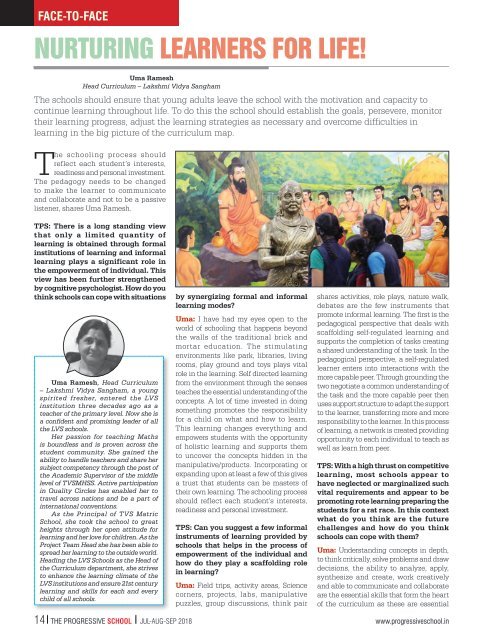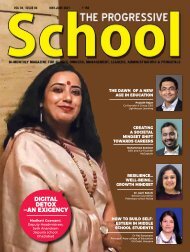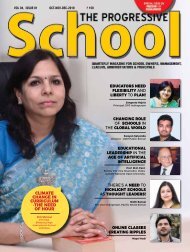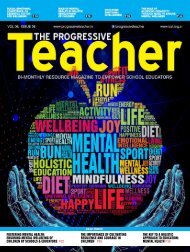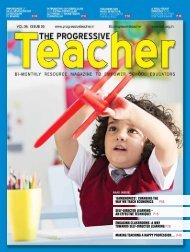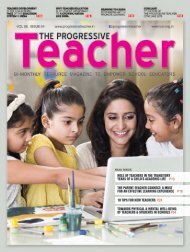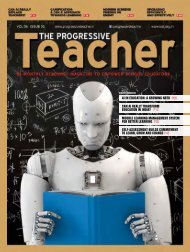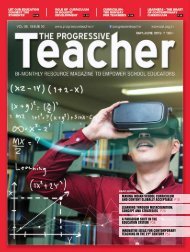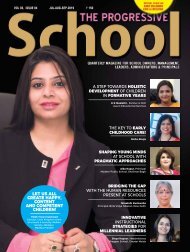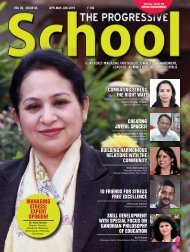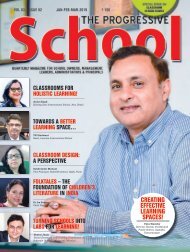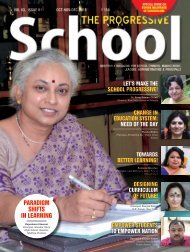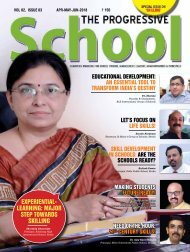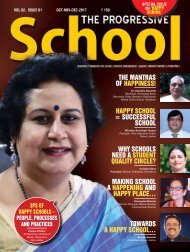The Progressive School Vol 02 Issue 04
The Progressive School is a quarterly magazine for school owners, leaders and principals. It will continue to address vital issues that impact the emerging challenges in the design, administration and growth of schools in all its dimension.
The Progressive School is a quarterly magazine for school owners, leaders and principals. It will continue to address vital issues that impact the emerging challenges in the design, administration and growth of schools in all its dimension.
You also want an ePaper? Increase the reach of your titles
YUMPU automatically turns print PDFs into web optimized ePapers that Google loves.
FACE-TO-FACE<br />
NURTURING LEARNERS FOR LIFE!<br />
Uma Ramesh<br />
Head Curriculum – Lakshmi Vidya Sangham<br />
<strong>The</strong> schools should ensure that young adults leave the school with the motivation and capacity to<br />
continue learning throughout life. To do this the school should establish the goals, persevere, monitor<br />
their learning progress, adjust the learning strategies as necessary and overcome difficulties in<br />
learning in the big picture of the curriculum map.<br />
<strong>The</strong> schooling process should<br />
reflect each student’s interests,<br />
readiness and personal investment.<br />
<strong>The</strong> pedagogy needs to be changed<br />
to make the learner to communicate<br />
and collaborate and not to be a passive<br />
listener, shares Uma Ramesh.<br />
TPS: <strong>The</strong>re is a long standing view<br />
that only a limited quantity of<br />
learning is obtained through formal<br />
institutions of learning and informal<br />
learning plays a significant role in<br />
the empowerment of individual. This<br />
view has been further strengthened<br />
by cognitive psychologist. How do you<br />
think schools can cope with situations<br />
Uma Ramesh, Head Curriculum<br />
– Lakshmi Vidya Sangham, a young<br />
spirited fresher, entered the LVS<br />
institution three decades ago as a<br />
teacher of the primary level. Now she is<br />
a confident and promising leader of all<br />
the LVS schools.<br />
Her passion for teaching Maths<br />
is boundless and is proven across the<br />
student community. She gained the<br />
ability to handle teachers and share her<br />
subject competency through the post of<br />
the Academic Supervisor of the middle<br />
level of TVSMHSS. Active participation<br />
in Quality Circles has enabled her to<br />
travel across nations and be a part of<br />
international conventions.<br />
As the Principal of TVS Matric<br />
<strong>School</strong>, she took the school to great<br />
heights through her open attitude for<br />
learning and her love for children. As the<br />
Project Team Head she has been able to<br />
spread her learning to the outside world.<br />
Heading the LVS <strong>School</strong>s as the Head of<br />
the Curriculum department, she strives<br />
to enhance the learning climate of the<br />
LVS institutions and ensure 21st century<br />
learning and skills for each and every<br />
child of all schools.<br />
by synergizing formal and informal<br />
learning modes?<br />
Uma: I have had my eyes open to the<br />
world of schooling that happens beyond<br />
the walls of the traditional brick and<br />
mortar education. <strong>The</strong> stimulating<br />
environments like park, libraries, living<br />
rooms, play ground and toys plays vital<br />
role in the learning. Self directed learning<br />
from the environment through the senses<br />
teaches the essential understanding of the<br />
concepts. A lot of time invested in doing<br />
something promotes the responsibility<br />
for a child on what and how to learn.<br />
This learning changes everything and<br />
empowers students with the opportunity<br />
of holistic learning and supports them<br />
to uncover the concepts hidden in the<br />
manipulative/products. Incorporating or<br />
expanding upon at least a few of this gives<br />
a trust that students can be masters of<br />
their own learning. <strong>The</strong> schooling process<br />
should reflect each student’s interests,<br />
readiness and personal investment.<br />
TPS: Can you suggest a few informal<br />
instruments of learning provided by<br />
schools that helps in the process of<br />
empowerment of the individual and<br />
how do they play a scaffolding role<br />
in learning?<br />
Uma: Field trips, activity areas, Science<br />
corners, projects, labs, manipulative<br />
puzzles, group discussions, think pair<br />
shares activities, role plays, nature walk,<br />
debates are the few instruments that<br />
promote informal learning. <strong>The</strong> first is the<br />
pedagogical perspective that deals with<br />
scaffolding self-regulated learning and<br />
supports the completion of tasks creating<br />
a shared understanding of the task. In the<br />
pedagogical perspective, a self-regulated<br />
learner enters into interactions with the<br />
more capable peer. Through grounding the<br />
two negotiate a common understanding of<br />
the task and the more capable peer then<br />
uses support structure to adapt the support<br />
to the learner, transferring more and more<br />
responsibility to the learner. In this process<br />
of learning, a network is created providing<br />
opportunity to each individual to teach as<br />
well as learn from peer.<br />
TPS: With a high thrust on competitive<br />
learning, most schools appear to<br />
have neglected or marginalized such<br />
vital requirements and appear to be<br />
promoting rote learning preparing the<br />
students for a rat race. In this context<br />
what do you think are the future<br />
challenges and how do you think<br />
schools can cope with them?<br />
Uma: Understanding concepts in depth,<br />
to think critically, solve problems and draw<br />
decisions, the ability to analyze, apply,<br />
synthesize and create, work creatively<br />
and able to communicate and collaborate<br />
are the essential skills that form the heart<br />
of the curriculum as these are essential<br />
14 THE PROGRESSIVE SCHOOL JUL-AUG-SEP 2018<br />
www.progressiveschool.in


